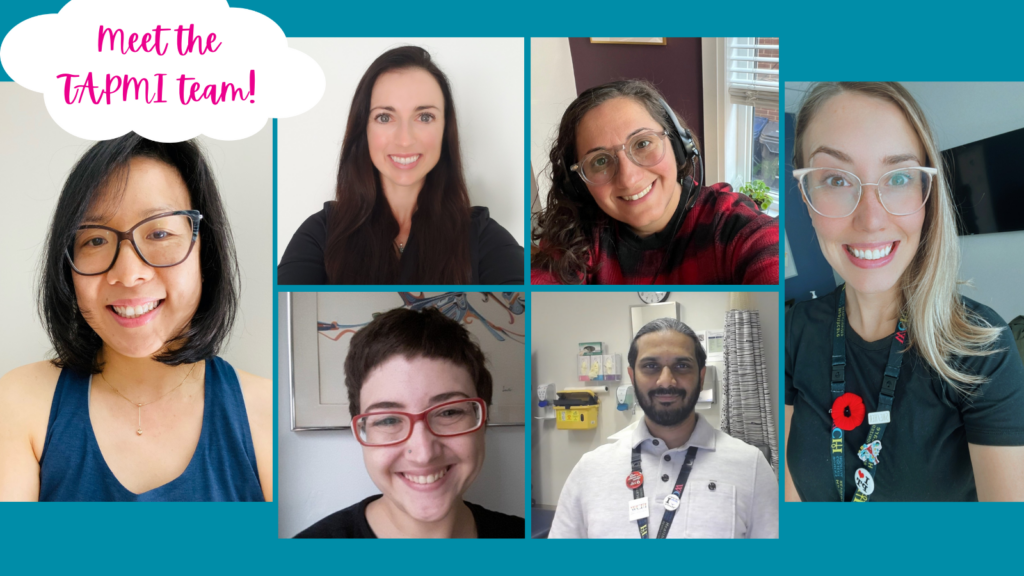
Persistent pain is a complex and personal experience. The interdisciplinary academic team at the Toronto Academic Pain Medicine Institute (or TAPMI) aims to address multiple facets of the pain experience. We work collaboratively with patients by empowering them to take pain management into their own hands and work towards their goals in a way that makes sense for them.
Each member of the team has a crucial role to play in helping patients manage their chronic pain.
Social workers like Sara Rahmani-Azad aim to empower patients through collaborative assessments of their needs, defining goals for treatment/management and finding resources within and outside the healthcare system. At TAPMI, our social workers work as part of TAPMI’s psychosocial and PAIN U self-management programs and are involved in teaching, supporting program planning, providing resources and collaborating with colleagues to support the best outcomes for patients.
Registered practical nurses (RPNs) like Cara Stanley, Kimberly Coombs and Christian Aquino provide health education in PAIN U and PAIN education groups. While there’s often no ‘magic pill’ to treat chronic pain, our nurses support patients to develop self-management strategies and skills that help patients learn to cope with the challenges of chronic pain and aim to improve their quality of life. Our nurses also work closely with clinic physicians to address any questions or concerns patients may have.
Pharmacists like Sofiya Hudani and Karen Ng work within an interdisciplinary team to help patients manage chronic pain with medication. This is done through comprehensive reviews of patients’ medications and educating patients about appropriate and safe medication use utilizing a harm reduction approach. Pharmacists are also involved in self-management groups, offering patients a general understanding of the role of various medications and medical cannabis for chronic pain management.
Physiotherapists like Harikrishnan Gopalakrishnan Nair, Olivia Drodge and Paula Jaloul also work within an interdisciplinary team approach to assess and offer treatment both individually and within a group context. At TAPMI, this can include helping patients differentiate between types of pain coupled with pain neuroscience education, which serves as a foundation to develop an exercise program that patients can feel safe and confident about integrating into daily life. Physiotherapists are also part of the PAIN U facilitation team, working with patients to develop an understanding of physical activity, pacing and how to develop exercise programs for pain self-management.
Occupational therapists (OTs) like Sarah Sheffe are involved in program development, group facilitation and coordination of the Young Adult Pain Clinic. Our OTs provide intervention through pain self-management education, cognitive-behavioural therapy (CBT) and acceptance and commitment therapy. They work closely with clients to set meaningful goals and adapt activities to help them stay involved in their work, relationships, leisure and communities.
Psychologists like Dr. Wendy Carter aim to bring a deeper understanding of how people’s emotions, beliefs, behaviours, personalities and previous experiences including trauma interact with the experience of pain. Psychologists meet with patients to assess their mental health needs, develop appropriate treatment plans and connect them to resources. On the TAPMI team, our psychologists clarify the meaning of psychological diagnoses and mental health issues with the aim of directing treatment, reducing stigma and enabling greater compassion and person-centred care.
TAPMI also has 17 physicians on the team who work closely with all health disciplines to facilitate treatment of chronic pain for our patients.
PAIN U
The goal of persistent pain treatment is to help patients manage their pain, achieve goals, find pleasure in life and be as healthy as possible. The PAIN U group includes education about pain biology and neuroscience, what triggers pain, and strategies to better manage pain and mood. During the eight week course, participants explore different strategies using both CBT and exercise techniques. PAIN U is offered as an eight week, 2.5 hours per week group. The group is currently being offered primarily virtually via Zoom, but is currently being piloted as an in-person group this fall.
PAIN U chronic pain self-management
There are many different areas to consider when developing a plan to manage pain. An important step is to understand how pain works in the body and mind, and this is where the PAIN U group starts. From there, we explore setting goals based on your values, pacing and physical activity, stress management and managing pain flares, sleep and brain fog, communication, the medical management of pain, and resources and supports that can help folks to maintain their progress after the group concludes. Much of the information discussed in the group can be found in our online modules that are freely available to anyone here!